Get to know our plenary speakers at ICOS Science Conference 2024! Read their full abstracts in the ICOS Science Conference 2024 programme
Emma Schoenmakers
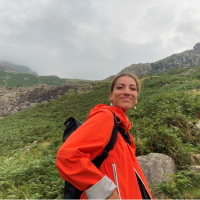
Emma Schoenmakers works as a research scientist at the Netherlands Organisation for Applied Scientific Research (TNO). Her current research focuses on understanding greenhouse gas emissions, particularly methane and carbon dioxide, understanding their spatial location and temporal patterns including point source locations to bridge the gap between local, regional and global emission inventories and observations, especially remotely-sensed plume data. Her background lies in the intersection of ecology, environmental sciences and machine & deep learning as tools to support ongoing research funded by the European Commission such as the Copernicus Atmospheric Programme’s regional emission inventories (CAMS), the ICOS Cities (PAUL) urban greenhouse gas measurement system as well as developing products to support upcoming satellite missions (TANGO).
In the plenary talk on Tuesday 10th September at 10:45, she will present the ICOS Cities (PAUL) project and the findings from downscaling greenhouse gas national inventories to high resolution city-scale and comparisons with local inventories in the pilot cities of Zurich, Munich and Paris to better support climate targets in European cities.
Yolandi Ernst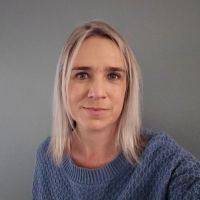
Dr Yolandi Ernst is a research officer at the Global Change Institute of the University of the Witwatersrand in Johannesburg, South Africa, where she also received her PhD in landscape ecology as a Carnegie Corporation of New York fellow. She applies her research focus on land use and adaptive land management in the African context to several aspects of socio-ecological systems such as biodiversity and ecosystems, biogeochemical cycling, agriculture and forestry. Her main research objectives are to contribute to a deeper understanding of the African greenhouse gas cycle through improving national and regional estimates of greenhouse gas fluxes and identifying natural climate solution pathways that can inform land use management initiatives and policy for climate change mitigation and adaptation. She is currently involved in various projects, working closely with programs, such as the Future Ecosystems for Africa (FEFA), the Southern African Science Service Centre for Climate Change and Adaptive Land Management (SASSCAL) and the Knowledge and Climate Services from an African Observation and Data Research Infrastructure (KADI) project.
In her plenary talk on Tuesday 10th of September at 11:10, Yolandi will present a synthesis of the most recent data and models of the African Greenhouse Gas Budget (2010–2019).
Karol Kulinski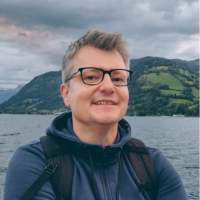
Dr Karol Kulinski works as an associate professor and head of the marine biogeochemistry section at the Institute of Oceanology of the Polish Academy of Sciences in Sopot, Poland. He also acts as a vice-chairman of the Baltic Earth Science Steering Group and an expert of the EN CLIME working group at the Helsinki Commission (HELCOM). Recently, he was one of the lead authors of the so-called Baltic Earth Assessments Reports, a series of publications describing comprehensively current and expected future changes in the Baltic Sea region induced by human activity and global climate change. In his research, he focuses primarily on the mechanisms and processes shaping the biogeochemical cycles of carbon and other macroelements in the Baltic Sea and shelf regions of the European Arctic. A core of his study is devoted to understanding the variability of marine CO2 system and Ocean Acidification in coastal and shelf waters with all the peculiarities and anomalies that occur in these regions.
In his plenary talk on Tuesday 10th of September at 11:35, Karol will present the recent findings from the time series research conducted in the land-ocean continuum between the Vistula River mouth and the southern Baltic Sea, where the occurrence of a natural-based alkalinisation makes the region a perfect spot for studying the ocean alkalinity enhancement concept.
Gianpaolo Balsamo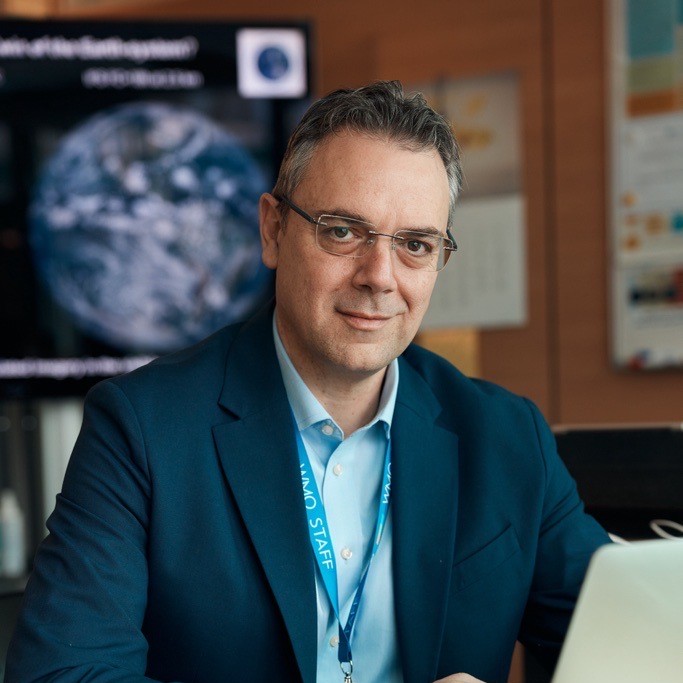
Dr Gianpaolo Balsamo serves as the director at the World Meteorological Organization (WMO), having joined in 2024 to lead the Global Greenhouse Gas Watch (G3W). This new flagship initiative aims to support the implementation of the Paris Agreement through the use of Earth Observations and Earth System Models. The G3W is dedicated to providing authoritative and precise data to support the Global Stocktake and the Nationally Determined Contributions under the Enhanced Transparency Framework of the Paris Agreement. Before this role, Gianpaolo coordinated the CO2 Human Emission European project, a precursor to the Copernicus CO2 service, CoCO2. This project was developed by the European Commission's Earth Observation Programme, Copernicus, with support from the Horizon 2020 and Horizon Europe Research Frameworks.
Gianpaolo holds a Ph.D. and a professorial accreditation from the University Paul Sabatier Toulouse III in Earth System Science. He is also an invited professor for the Climate Change Solutions Master's program at the Politecnico di Torino. Born and educated in Torino, Balsamo has a deep affection for his city and region. To date, he has lived and worked in five countries: Italy, France, Canada, the UK, and currently, Switzerland.
Ilse Aben
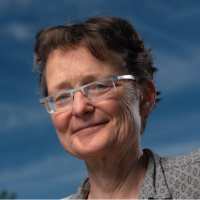
Prof Dr Ilse Aben is a senior scientist in the Earth group at SRON Netherlands Institute for Space Research. Her group at SRON focuses primarily on the interpretation of satellite remote sensing data of greenhouse gases (CO2 and methane) and related species as part of the Carbon cycle research. Ilse is the Dutch Co-Principal Investigator and co-initiator of the TROPOMI instrument on the Sentinel-5 Precursor mission. She leads the SRON TROPOMI team responsible for safeguarding the scientific performance of the TROPOMI SWIR channel measuring CO and methane. Ilse is a.o. responsible for a number of projects in her group focusing on detection and emission quantification of localised and area sources of methane funded through different funding agencies (UNEP, ESA, GMH, CAMS). Ilse is endowed professor at the Earth Sciences department of the Vrije Universiteit in Amsterdam, a member of the CCAC Science Advisory Panel, and member of various Mission Advisory Groups.
Ilse is giving a plenary talk about using satellites in support of methane emission reductions on Wednesday 11th of September at 9:25.
Emily Hammermeister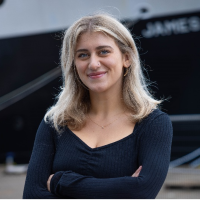
Emily Hammermeister is a PhD candidate in her final year at the University of Southampton, based at the National Oceanography Centre (NOC) in Southampton, UK. At NOC, she is a part of the Ocean Technology and Engineering (OTE) group which works to develop and deploy autonomous biogeochemical ocean sensors. Her current research focuses on the scientific applications of autonomous in situ carbonate sensors and their performance as an ocean observation tool. Emily has been involved in the integration of these sensors on platforms, such as Autonomous Underwater Vehicles (AUVs), designing observing strategies, and developing methodologies for observation and visualisation. She has led multiple field deployments where she collected novel biogeochemical data and evaluated sensors against “gold standard” laboratory techniques. Emily holds a BSc in oceanography and BA in business from the University of Washington in Seattle, WA, and has experience working in the private sector as a submersible pilot as well as an environmental scientist.
In her plenary talk on Wednesday 11th September at 9:50, Emily will cover recent successful deployments of novel autonomous carbonate sensors, presenting their results and highlighting future perspectives.
Andrés Tangarife-Escobar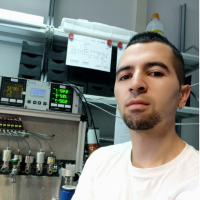
Andrés Tangarife-Escobar is a PhD candidate at the Max Planck Institute for Biogeochemistry in Jena, Germany. His research focuses on understanding the timescales of carbon cycling in organic-rich ecosystems under environmental change. He achieves this by measuring radiocarbon (14C) through laboratory experiments and modeling approaches. His study areas include the grasslands and peatlands of the Tibetan Plateau, the boreal forests of northern Sweden, the permafrost soils of Alaska, and his beloved Andean Mountains. By combining 14C measurements in atmospheric CO2, soils and vegetation, he aims to understand carbon allocation and transit times.
Andrés has been deeply committed to "science for the people," working to bridge the discourses between NGOs, grassroots communities, the private sector, and the Colombian government to resolve socio-environmental conflicts. As a researcher from the Global South, one of his primary goals is to close the data gap in regions of South and Central America. He seeks to achieve this by fostering collaboration with local institutions and introducing measurement infrastructure to these regions.
Thomas Colligan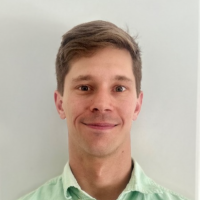
Thomas Colligan is a scientific software developer at NASA Goddard Space Flight Center / University of Maryland Earth System Science Interdisciplinary Center. He holds an M.S. in Computer Science from the University of Montana. His current work focuses on creating high quality, low latency biospheric carbon products using the LPJ-EOSIM dynamic global vegetation model, providing valuable insights into carbon dynamics and enhancing predictive capabilities. His main research focuses on predicting anomalous biospheric emissions, allowing rapid quantification, attribution, and verification of emission hotspots.
Malavika Sivan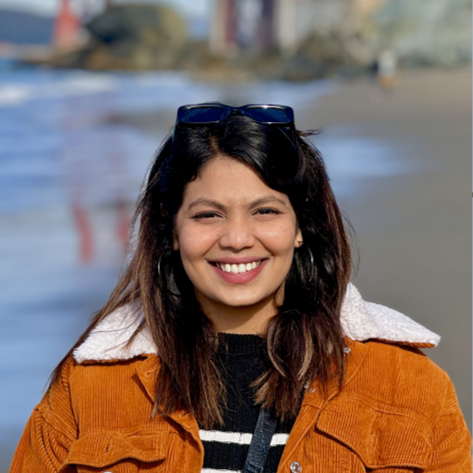
Malavika Sivan is a postdoctoral researcher at the Institute for Marine and Atmospheric Research Utrecht, the Netherlands. She carried out her PhD in Atmospheric Physics and Chemistry and holds a Master's degree with a major in Chemistry and a minor in Earth and Environmental Science. During her doctoral studies, Malavika specialised in measuring and modelling clumped isotopologues of methane from various sources and the atmosphere. Her research focuses on quantifying and enhancing understanding of the factors influencing the clumped isotope budget. She aims to utilise these measurements as tracers to gain further insights into the global methane cycle.